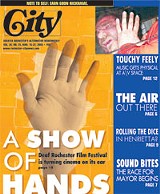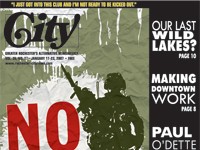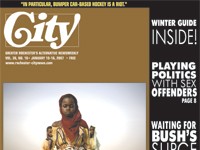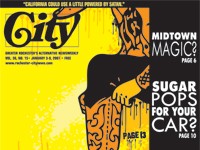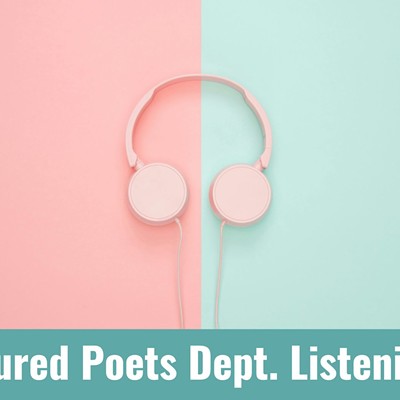A show of hands
Deaf Rochester Fim Festival is turning cinema on its ear
By Dayna Papaleo @daynadoesdishes[
{
"name": "500x250 Ad",
"insertPoint": "5",
"component": "15667920",
"parentWrapperClass": "",
"requiredCountToDisplay": "1"
}
]
I know what you're thinking. Does this town really need another film festival?
If it's the Deaf Rochester Film Festival, then the answer might be yes. This city's rich tradition in the moving image coupled with its sizeable deaf population --- the largest per capita in the United States --- make it the ideal location for a film festival that showcases work by and about the deaf and hard of hearing.
The truly ignorant among us are no doubt wondering about the feasibility of films that were made and ostensibly will be viewed by people without one of the senses traditionally used to create and enjoy movies.
"The deaf world is a visual one and because of this they are, first and foremost, people of the eye," Dr. Jane Norman said in an email interview. Norman is a Gallaudet University professor, an expert in media studies and deaf cinema, and the festival's keynote speaker. "It is interesting to note that sign language is often said to be parallel to film language. Deaf filmmakers bring a unique perspective to films. The emphasis is on visualization."
American Sign Language is a visual-spatial language, and when someone is telling a story in ASL, they rely upon a series of gestures and facial expressions to indicate close-ups, medium shots, and long shots, even scene cuts. The jump to filmmaking seems like a natural one because, with apologies to the other arts, filmmaking is arguably the most visual art of all.
Before the advent of movie sound, filmmakers were able to tell intricate stories that entertained and enlightened anyone with working eyeballs. And thanks to subtitling, differences between the language of the film and the language of the audience can be overcome.
The burgeoning deaf cinema movement is a logical evolution as many minority cultures --- gay, black, Jewish, Latino --- turn to film as a way to express themselves and educate others. And Patricia Durr, artistic director for DRFF and NTID professor, is surprised that it's taken this long for deaf cinema to emerge, with deaf film festivals only cropping up within the past three to four years.
"I find deaf cinema to be very exciting because it is a natural form of expression by and for deaf people," she said in an email interview, "and because it affords deaf people the opportunity to control and shape how they are represented."
DRFF opens Friday, March 18, at the Little Theatre with a screening of Secret Love (Still Liebe), a Swiss feature-length film about the relationship between a deaf nun and a deaf circus performer, and continues through the weekend at various venues with programs of short films by professional and student filmmakers as well as panel discussions, networking opportunities, and Norman's keynote address.
It closes Sunday, March 20, with a screening of Dear Frankie, winner of the Audience Award at the 2004 High Falls Film Festival, at NTID's Panara Theatre.
In the past, most depictions of the deaf experience have been made by hearing people and focused on the deaf individual's inability to communicate with a hearing world. Only recently has deafness been viewed as an actual culture with a language and traditions of its own rather than as a handicap, and that's because deaf people are playing an increasingly larger role in dictating how they are portrayed. But Dr. Norman believes that mainstream media has not yet revealed the fullness of life in the deaf community.
"Once the media understands and accepts this concept," she said, "the possibilities and range of stories of deaf people are powerful, universal, and without limits."
In order for a film to be considered for DRFF, it had to be produced by a deaf or hard-of-hearing filmmaker, be highly visual in design, or be about the deaf experience. If the work met at least two of those entry requirements, it made it to the festival's Selection Committee, headed by Durr, who said, "Our standard then was basically excellence."
As a result, a number of interesting and accomplished short films have found their way into the inaugural Festival, including two by Rochester native Irene Taylor Brodsky. Ishara shines a bright light on the deaf living in Nepal, where many believe hearing loss is due to karma and the deaf people in the more remote villages are basically consigned to a life of manual labor and isolation. There's a school in Kathmandu, however, where deaf children from different regions and different castes come together to learn how to communicate and ensure a better quality of life.
Brodsky's Deaf Northwest takes an affectionate look at the only assisted-living facility exclusively for deaf and deaf-blind adults in the United States. Seniors who had previously been living in solitude come to Deaf Northwest and get the proverbial new lease on life as they connect with their peers in a setting that has obviously thought of everything that would secure the comfort of its residents. And one employee of the facility spoke the most basic yet overlooked truth: "Deaf people can do anything except for hear."
The short films to be presented in the Panara Theatre as part of Saturday's events feature works by filmmakers from around the globe. The UK's Chronic Embarrassment catches up with three pals as they discuss the misunderstandings that can ensue at a dance club. Alice and the Aurifactor is an expressionist fairy tale from Germany in which Alice must save the deaf world from an evil sorcerer. The student films taking center stage Saturday evening at RIT's Webb Auditorium include Eclipse, filmed in the style of a silent movie about the power of the sun, the moon, and love; as well as The Lost Reels, a short about a man who is deaf and blind that will be presented only in sign language in accordance with the wishes of the film's director.
Sunday morning at the Panara Theatre is set aside for the documentaries. Besides the aforementioned Brodsky films, of particular interest to a Rochester audience are RIT/Gallaudet Weekend, a fun look at the annual get-together between the country's two premier deaf-centric institutes of higher learning, and Preserving Old Stonewalls: The Rochester School for the Deaf, which was done as part of the Rochester Deaf Heritage Preservation Project and focuses on the role RSD has played in the community for well over a century.
And on Sunday morning over at the Strasenburgh Planetarium, the DRFF presents a program of live-action and animated shorts for kids, featuring Deafplanet.com, a cartoon about a boy who crashes his rocket ship into a world where everyone is deaf, as well as two shorts --- I'm Feeling Better Now and The New Kid --- by the video production classes at RSD.
The title character in the festival's closing weeper, Dear Frankie, is a deaf 9-year-old (Jack McElhone) whose mother has been weaving what she thought was a simple lie in order to protect her son from the truth about his father. Lizzie (Emily Mortimer, who also starred with McElhone in Young Adam) writes letters to Frankie in the voice of his supposedly absent sailor father to foster the illusion that Frankie has a loving dad.
In true cinematic fashion, the name that Lizzie made up for the ship belongs to one that actually exists... and is headed straight for Glasgow. Lizzie must decide whether to come clean with her son or find a way to sustain the fiction by enlisting someone to pose as Frankie's father.
Oh, come on --- there wouldn't be much of a movie industry if everyone walked around telling the truth, now would there? McElhone is terrific, Mortimer turns in a lovely performance as a woman so used to being on the defensive that she's forgotten how to trust, and the normally wooden Gerard Butler (last seen as the Phantom in The Phantom of the Opera) uses his oak face to his advantage as the mysterious stranger pretending to be Frankie's dad.
Director Shona Auerbach --- who also acted as cinematographer here --- is in charge of the naked, obvious manipulation, but movies are supposed to make people feel something. Just look past the believability and let the film have its way with you.
DRFF offers deaf and hard-of-hearing people the all-too-rare opportunity to see portrayals of deaf culture by the people who live, work, and play in it. Durr hopes it will inspire some of them to memorialize their own insights into deaf culture.
"I think this film festival clearly shows the deaf point of view," Durr said, "and the great importance of experiencing our world through the lens more than the ear."
And I would hope this goes without saying, but the festival is not just for the deaf. DRFF organizers have done everything possible to make the festival accessible to hearing folks as well with subtitles and voice interpretation.
"We do not want hearing people to endure the experiences that we generally have to," Durr said.
The only working body parts necessary to appreciate the DRFF's films and lectures are minds and hearts. It's best to have both of those open at all times anyway.
Deaf Rochester Film Festival Schedule
Friday, March 18
Secret Love/Stille Liebe(Switzerland, 90 minutes), Little Theatre, 240 East Avenue, 7 p.m.
Post-film discussion, facilitated by Dr. Jane Norman, Spot Coffee, 200 East Avenue, 8:30 a.m.
Saturday, March 19
Registration, 8:30 a.m.
Short films program, 9-11:30 a.m.
Networking lunch, Dyer Art Center, Lyndon B. Johnson Building, NTID campus, 11:30 a.m.-1 p.m.
Keynote address, Dr. Jane Norman, 1-2 p.m.
Short films program, 2:30-4:30 p.m.
Student films program, Webb Auditorium, Booth Building, RIT campus, 7 p.m.
Sunday, March 20
Registration, 8:30 a.m.
Documentaries program, 9 a.m.
Children's films, Strasenburgh Planetarium, RMSC, 657 East Avenue, 10 a.m.
Brunch, Dyer Art Center, 12-1 p.m.
"Reel Possibilities" panel discussion, Panara Theatre, 1-2 p.m.
Wrap-up remarks, Dr. Jane Norman, Panara Theatre, 2 p.m.
Dear Frankie (Scotland, 142 minutes), 2:30 p.m.
All events are in the Panara Theatre, Lyndon B. Johnson Building, NTID campus, unless otherwise noted. Tickets are $10-$20 for a day pass, $40 for an all-festival pass; the children's program is $2 per person; a food pass is $30. To order tickets or to get more information, visit www.ntid.rit.edu/drff/ or email [email protected].
Explore more about the Rochester Deaf Film Festival by clicking here!
Speaking of Deaf Rochester Film Festival
-

Calendar preview: Open and Out
Oct 8, 2020 -
XX files
Mar 16, 2005 - More »
Latest in Featured story
More by Dayna Papaleo
-

Festival Preview: ImageOut 2017
Oct 4, 2017 -
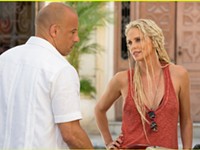
Film review: 'The Fate of the Furious'
Apr 17, 2017 -
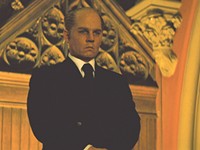
Rat tales
Sep 23, 2015 - More »
